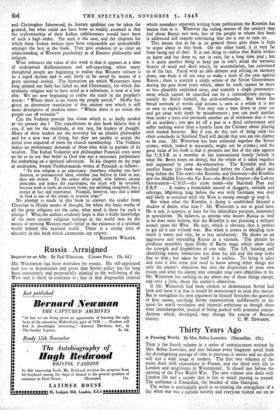Russia Arraigned
Inquest on ari Ally. By Paul Winterton. (Cresset Press. 12s. 6d.) MR. WINTERTON has been overtaken by events. His self-appointed task was to demonstrate and prove that Soviet policy has for long been consistently and purposefully inimical to the well-being of the West and is likely tocontinue- so ; but in that disgraceful interval which nowadays 'separates writing from publication the Kremlin has beaten him to it. Whatever the toiling masses of the country may feel about Russia just now, few of the people to whom this book is addressed still require convincing that she is out to ruin us. This means that as far as its general thesis goes there is little to argue about in this book. On the other hand, it is very tar from being out of date. It is one thing to realise that Stalin wishes us harm and has done so, not in vain, for a long time past ; but it is quite another thing to keep pat in one's mind the 'tortuous history of- word and deed which, by accumulation, has convinced us of the fact. Faced with an able debater and relying on memory alone, one finds it all too easy to make a hash of -the: case against Russia ; there is scarcely a single, action of the- Soviet -Government during the past three years which, taken by itself, cannot be more or less plausibly explained away, and scarcely a single .-pronounce- ment which cannot be cancelled out by a contradictory.. saying— usually by Stalin himielf, the arch-confounder, But when the broad network of words and actions is seen 'as. a whole - it is not so easy- to explain away. You may run a man down' in your car and get away with death by misadventure ; you can push another man under a train and persuade another set of witnesses that it was all an accident ; you Afin let off a gun at a third unfortunate and suffer nothing worse than a homily from the Coroner about playing with loaded firearms. But if you do this sort of thing. once too often somebody in Scotland Yard will decide that you are-too cluinsy to be true. Mr. Winterton has here collected together the Soviet crimes, which, looked at separately, might not be crimes ;- and the great value of his book is that it presents not bits of the case against the U.S.S.R. as a member of the international family lwhich is what Mr. Bevin keeps on doing), but the whole of it taken together and supported by close documentation. The Kremlin and the satellite States (the book was finished before the Czech affair and long before the Tito row)—the Kremlin and Germany—the Kremlin and the Middle East—the Far East—the British Empire—the Labour Government—U.N.O.—the atom , bomb—the- Marshall Plan and E R P It makes a _formidable ,record of thuggery, swindle and sabotage; beginning long before the war- with Germany :was over and likely to continue until the West is strong enough tp stop it.
But when what the Kremlin is doing is established l?eyond A shadow of doubt, what next ? Mr. Winterton is not so good here. He is not, it appears, at least for his immediate purpose, interested in speculation. He believes, as anyone who knows ,Russia as well as he does must believe, that the Krenilin is not planning a military assault upon the West He says, which is obvious, that it prefers to get all it can withotk war. But when it comes to deciding how- much it wants and why, he is less satisfactory. He shows us -an aggressive and expanding Russia in a vacuum:- :The picture he produces resembles those- Order of Battle maps which show only the strength and disnblitions of one side. The I.O. locating and identifying enemy forMations has done his job and the map looks fine to him ; but taken by itself it is useless. To -bring it alive and turn it into sense you need to know among _other things not only the enemy's objectives but also, the disposition of your own troops -and-what the enemy may consider your own objectives-to be Mr. Winterton has nothing to say about any of these things except, and only a little, about the enemy's objectives. If. Mr. Winterton had been content to demonstrate Soviet bad faith and leave it at that it would be unnecessary to raise this matter. But to strengthen his cjwn argument he himself broaches the question of first causes, ascribing Soviet expansionism indifferently to the quest for world revolution and imperial ambitions as though these were interchangeable, instead of being packed with potential contra- dictions which, developed, may change ' the course of Russian










































 Previous page
Previous page